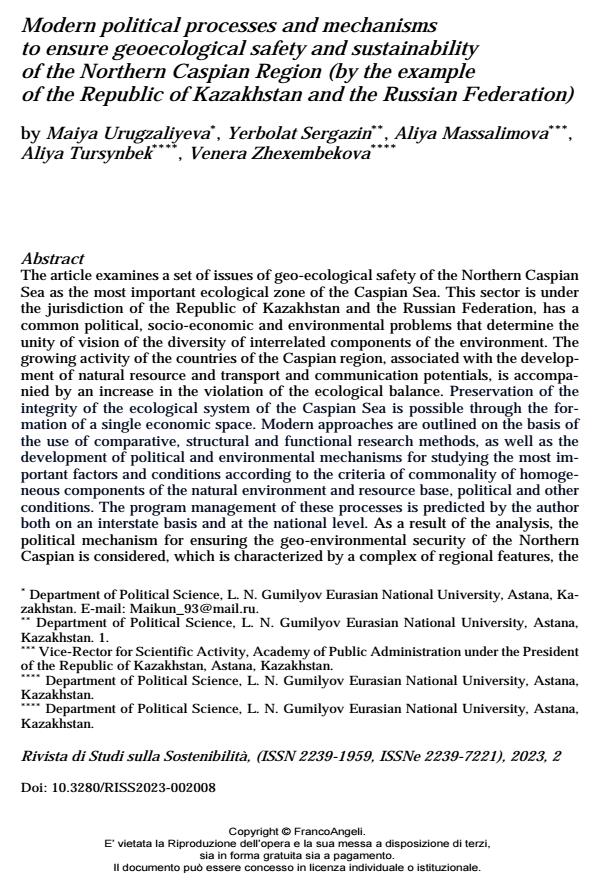Modern political processes and mechanisms to ensure geoecological safety and sustainability of the Northern Caspian Region (by the example of the Republic of Kazakhstan and the Russian Federation)
Journal title RIVISTA DI STUDI SULLA SOSTENIBILITA'
Author/s Maiya Urugzaliyeva, Yerbolat Sergazin, Aliya Massalimova
Publishing Year 2024 Issue 2023/2
Language English Pages 19 P. 129-147 File size 120 KB
DOI 10.3280/RISS2023-002008
DOI is like a bar code for intellectual property: to have more infomation
click here
Below, you can see the article first page
If you want to buy this article in PDF format, you can do it, following the instructions to buy download credits

FrancoAngeli is member of Publishers International Linking Association, Inc (PILA), a not-for-profit association which run the CrossRef service enabling links to and from online scholarly content.
The article examines a set of issues of geo-ecological safety of the Northern Caspian Sea as the most important ecological zone of the Caspian Sea. This sector is under the jurisdiction of the Republic of Kazakhstan and the Russian Federation, has a common political, socio-economic and environmental problems that determine the unity of vision of the diversity of interrelated components of the environment. The growing activity of the countries of the Caspian region, associated with the development of natural resource and transport and communication potentials, is accompanied by an increase in the violation of the ecological balance. Preservation of the integrity of the ecological system of the Caspian Sea is possible through the formation of a single economic space. Modern approaches are outlined on the basis of the use of comparative, structural and functional research methods, as well as the development of political and environmental mechanisms for studying the most important factors and conditions according to the criteria of commonality of homogeneous components of the natural environment and resource base, political and other conditions. The program management of these processes is predicted by the author both on an interstate basis and at the national level. As a result of the analysis, the political mechanism for ensuring the geo-environmental security of the Northern Caspian is considered, which is characterized by a complex of regional features, the main of which is the recognition of the unity of the ecological system of the Caspian Sea.
Keywords: sustainability, political mechanisms, ecological system, security, geoecology, geopolitics.
Maiya Urugzaliyeva, Yerbolat Sergazin, Aliya Massalimova, Modern political processes and mechanisms to ensure geoecological safety and sustainability of the Northern Caspian Region (by the example of the Republic of Kazakhstan and the Russian Federation) in "RIVISTA DI STUDI SULLA SOSTENIBILITA'" 2/2023, pp 129-147, DOI: 10.3280/RISS2023-002008